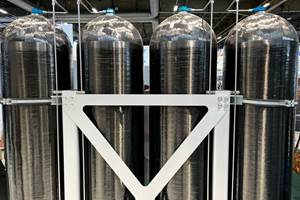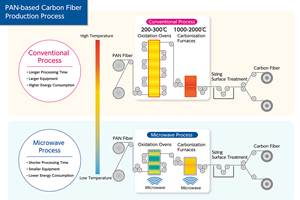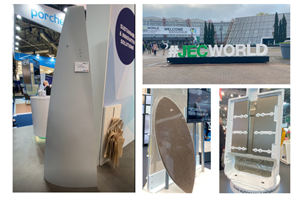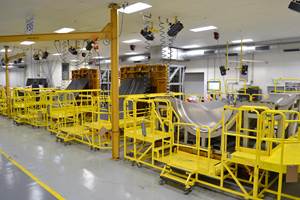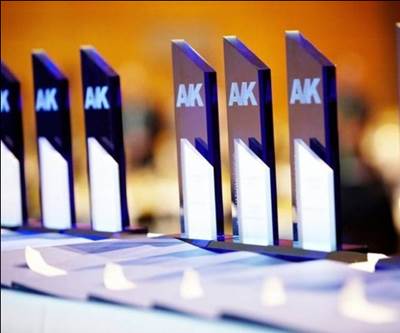AVK announces winners of 2020 Innovation Awards
Several sustainable composite innovations were recognized and awarded in the Innovative Products/Applications, Innovative Processes and Research and Science categories.
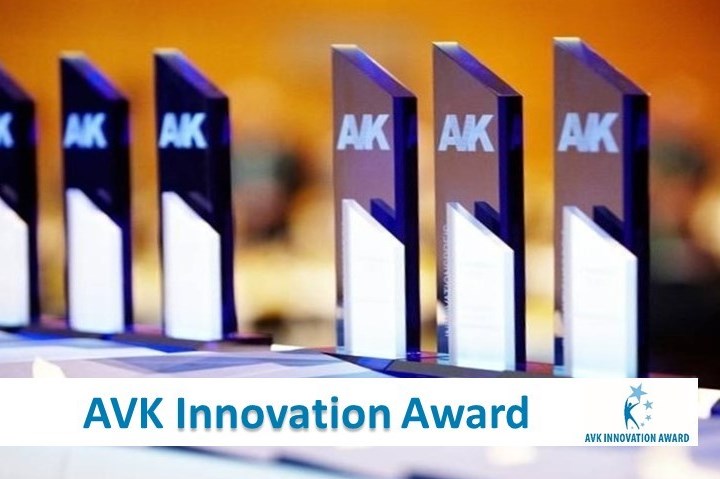
Photo Credit: AVK
AVK (Industrievereinigung Verstärkte Kunststoffe e.V., Frankfurt, Germany), the German Federation of Reinforced Plastics which represents the interests of manufacturers and processors both in Germany and at the European level, virtually announced on Nov. 7 the winners of its 2020 Innovation Awards. Decided by an expert jury, the awards recognize and honor sustainable composite innovations in three categories: Innovative Products/Applications, Innovative Processes and Research and Science.
“We were delighted to receive so many strong submissions again in 2020. Many aspects of the process were, of course, different this year. For the first time, the award ceremony was held as an internet event. However, it is clear that everyone everywhere is making the best of the situation. The positive trends in the field of fiber-reinforced plastics are still continuing. We expect these important materials to be at the heart of many innovations in the coming years,” says Gerhard Lettl, chairman of the jury.
“Innovative Products/Applications” category
Directly-cooled electric motor with integral lightweight housing made of fiber-reinforced polymers - DEmiL.
First place goes to the Fraunhofer Institute for Chemical Technology (ICT, Pfinztal, Germany) in partnership with the Karlsruhe Institute of Technology (Karlsruhe, Germany) and Sumitomo Bakelite Co., Ltd. (Japan). This high-performance electric motor is said to prove that fiber-reinforced plastics can be used to produce smaller and lighter structures than standard metal designs. The motor achieves a continuous output of 58 kilowatts (kW) at a weight of 10.5 kilograms. According to AWK, the power density of 5.5 kilowatts per kilogram sets a new standard for electric motors that can be produced in large series. A cooling system was integrated into the housing, which dissipates the heat generated by the motor directly at source and makes it possible for composites to be used in the construction.
Intrinsically Reprocessable, Repairable and Recyclable (3R) thermoset composites for more Competitive and Sustainable Industries.
Second place was awarded to Cidetec (Donostia-San Sebastián, Spain). According to Cidetec, these use dynamic and covalent bonding to create a new generation of thermoset composites which, alongside the familiar performance characteristics, are claimed to have other properties never seen before in this form. Further, Cidetec says the materials can be easily reconditioned, recycled or repaired.
Fireproof composite metal hybrid structure - LEO fire protection sandwich with integrated Hyconnect steel-glass hybrid connector.
Third place was awarded to Saertex GmbH & Co. KG ((Saerbeck, Germany) and Hyconnect GmbH (Hamburg, Germany). According to AVK, this is a 3D-reinforced composite sandwich structure, into which fire protection layers can be inserted to insulate and cool in case of fire. Standard epoxy resins can be used during vacuum infusion to integrate a hybrid glass-metal structure which traditional metal components can be attached to via welding, providing a fireproof connection at an early stage of the process. This fire protective covering forms an insulating layer in case of fire and also protects the sandwich component and the hybrid connection. In contrast to traditional metal composites, this product can reduce weight by up to 55%.
“Innovative Processes” category
Robotized Injection Molding (ROBIN) process.
First place in the “Innovative Processes” category was awarded to ROBIN and the Institute for Lightweight Engineering and Polymer Technology at TU Dresden (Germany). Using carbon fiber in a composite C-frame injection molding machine, the developers were able to build a machine that weighs less than 140 kilograms. This allows the machine to be attached to a robot, for example, and moved around freely in a room. Improving the mobility of plant technology generates greater flexibility in the injection molding process for the production of hybrid components, while simultaneously making it possible to manufacture lightweight products in a manner that saves resources.
Omega stringer from the roll.
Developed by second place winner, the German Aerospace Center (DLR, Cologne, Germany), this new manufacturing process allows omega-shaped stiffening elements to be produced from carbon fiber epoxy resin prepregs. It enables manufacturers to produce stringers efficiently at low cost and in large quantities while also saving resources. The process chain as a whole combines automated fiber placement (AFP) technology, single-sided membrane forming — also known as hot forming — and autoclave curing. The simultaneous forming of cross-sections with positive and negative curvatures is considered a unique process feature.
Hybrid die-casting: manufacturing of intrinsic CFRP-aluminium composite structures in aluminium high-pressure die-casting.
Third place was awarded to this process, developed by the Faserinstitut Bremen (FIBRE), and Fraunhofer IFAM research institutes (Bremen, Germany). This new process, says both institutes, provides a technique for joining aluminum alloys and carbon fiber-reinforced plastics by melting the thermoplastic layer. The thermoplastic layer simultaneously creates an electrochemical separation between the carbon fiber and the aluminum alloy, preventing contact corrosion, and strength is achieved at the material’s interface. The process saves resources and can be used in series production. Due to its potential in lightweight construction, it could reduce CO2 emissions from vehicles.
“Research and Science” category
New high-temperature-resistant UP resins and toughening agents.
In the category “Research and Science,” first place was awarded to Münster University of Applied Sciences (Münster, Germany). The UP resin achieves a heat distortion temperature (HDT) of almost 250°C; the highest previously measured HDT is around 180°C. The photochemical and thermal reactivity is significantly higher than that of comparable high-temperature resistant vinyl esters and urethanes, says the university. Further, the toughening agents are based on styrene-maleic anhydride copolymers and increase the viscosity of the resin at temperatures between 100-160°C. At the same time, they increase reactivity and improve the surface quality of the laminate.
Scientific principles for the industrial application of the thermoplastic resin transfer molding (T-RTM) process.
Fraunhofer ICT was additionally awarded second place for its innovative process, which evaluates the negative effects of moisture in T-RTM. The process compensates for water in order to restore the prior reaction speed with almost identical polymer properties. With a newly developed simulation model, the process can be controlled specifically by modeling the process kinetics. This leads to a highly efficient process and enables T-RTM components to be manufactured in series production environments.
Material- and energy-efficient production of turbine struts by the integrative combination of thermoset fiber-reinforced materials.
Third place was awarded to the Institute of Polymer Technology at the University of Erlangen (Germany) for its project. The “Duro-IMF process,” as it’s termed, which was developed in the course of the research project, enables complex thermoset fiber composite components to be manufactured efficiently by thermoset injection molding. The process combines continuous fiber-reinforced prepregs and short fiber-reinforced molding materials in the one-shot principle. By coordinating the material modification and intelligent process controls, the resin systems of the materials react irreversibly with each other during curing in the mold, resulting in a hybrid component with high bonding strength, low weight and high temperature resistance, as well as a reduction in energy consumption and cycle time of more than 50%.
In addition to being virtually awarded on Nov. 12, many of the award winners’ innovations will be presented again in this year’s AVK Innovation Award brochure, which will be available online here.
Related Content
Recycling hydrogen tanks to produce automotive structural components
Voith Composites and partners develop recycling solutions for hydrogen storage tanks and manufacturing methods to produce automotive parts from the recycled materials.
Read MoreMicrowave heating for more sustainable carbon fiber
Skeptics say it won’t work — Osaka-based Microwave Chemical Co. says it already has — and continues to advance its simulation-based technology to slash energy use and emissions in manufacturing.
Read MoreJEC World 2023 highlights: Recyclable resins, renewable energy solutions, award-winning automotive
CW technical editor Hannah Mason recaps some of the technology on display at JEC World, including natural, bio-based or recyclable materials solutions, innovative automotive and renewable energy components and more.
Read MorePlant tour: Middle River Aerostructure Systems, Baltimore, Md., U.S.
The historic Martin Aircraft factory is advancing digitized automation for more sustainable production of composite aerostructures.
Read MoreRead Next
AVK presents its 2018 Innovation Awards
The 2018 AVK Innovation Awards were presented at the International Composites Congress (ICC) on Nov 5, chosen from more than 50 submissions.
Read MorePlant tour: Daher Shap’in TechCenter and composites production plant, Saint-Aignan-de-Grandlieu, France
Co-located R&D and production advance OOA thermosets, thermoplastics, welding, recycling and digital technologies for faster processing and certification of lighter, more sustainable composites.
Read MoreVIDEO: High-volume processing for fiberglass components
Cannon Ergos, a company specializing in high-ton presses and equipment for composites fabrication and plastics processing, displayed automotive and industrial components at CAMX 2024.
Read More

















.jpg;maxWidth=300;quality=90)

